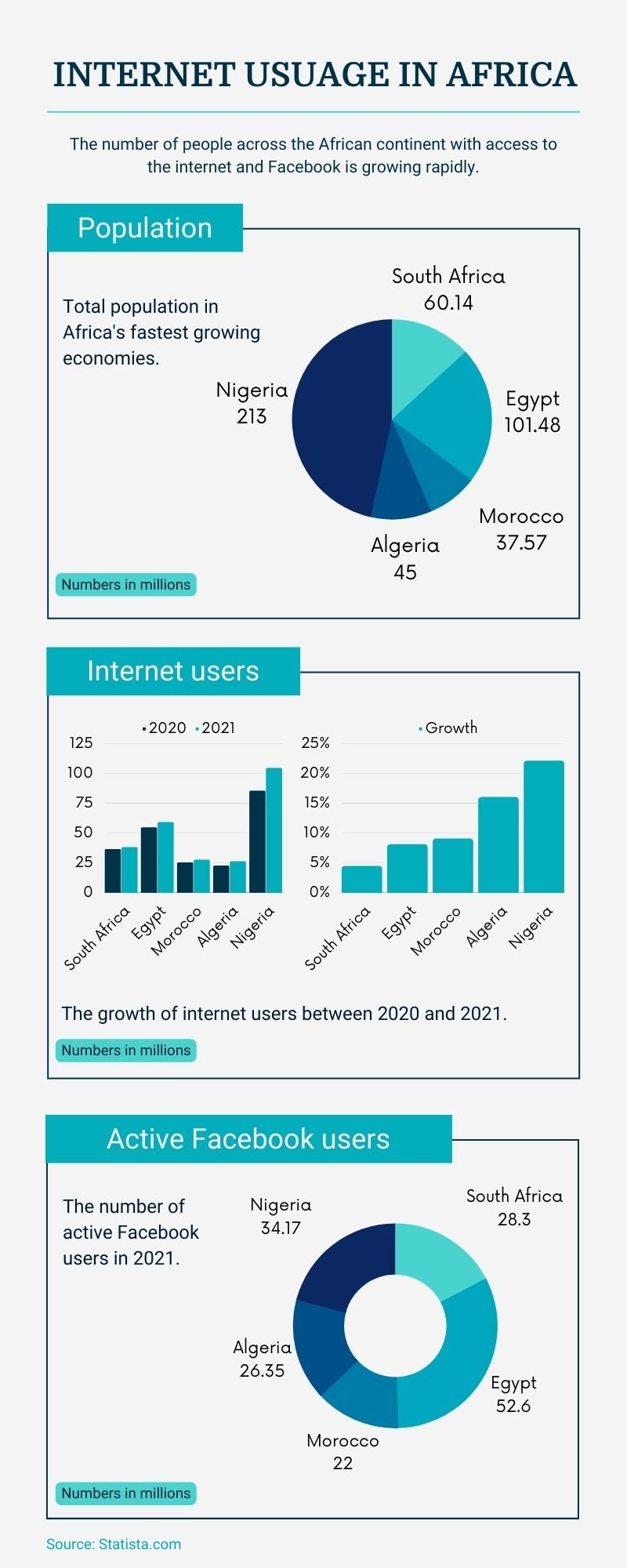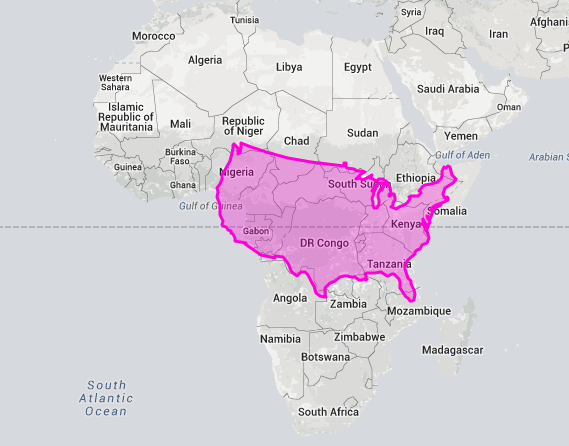The astronomical growth in online activity in Africa – and the potential for digital marketing – can’t be ignored. For all those interested in marketing in Africa, you need to know what’s happening on the continent.
Digital media marketing in emerging markets, particularly Africa, is a challenge. The development of agencies and client management in digital marketing are not as clear-cut on the continent as it is in the Western world. Digital marketing is by no means mature in the region yet and often lack consistent processes, clearly defined goals, consistent, clear messaging and a clearly defined – and understood – target audience.
There are factors one need to consider when undertaking marketing projects in the region, elements you might not even know exist or consider in other areas of the world. Economies, socio-political intricacies, language barriers, multiple currencies and regional conflicts will all count against you if you are working in a digital marketing agency or as a digital expert with a focus on Africa.
Africa comprises 54 countries, with over 2 000 living or spoken languages (522 in Nigeria alone!). And, if the statistical growth of active online users is anything to go by, the continent is on the cusp of a digital revolution.
We’ve “run the numbers” and the continent is opening up for digital marketing agencies in a big way.
However, successful marketing is one of the most challenging (and underestimated) aspects of businesses new and old. And the question is, how do you go about marketing in Africa?
There are a great many marginalised communities that need specific attention and information regarding services or products that you will need to reach. But it’s not as simple as putting up billboards with over 2 000 living or spoken languages (522 in Nigeria alone!). And, if the statistical growth of active online users is anything to go by, the continent is on the cusp of a digital revolution
So let’s have a look at what the numbers are saying.
Statistics Don’t Lie (most of the time)
The volume of internet users in Africa has grown immensely the last 18 years:

South Africa
Population: 55,436,360
Internet users year 2000: 2,400,000
Internet users year 2077: 29,935,634
Active Facebook users 2017: 16,000,000
That’s an increase of 1,147.3% in active internet users.
Egypt
Population: 95,215,102
Internet users year 2000: 450,000
Internet users year 2017: 37,333,841
Active Facebook users 2017: 33,000,000
That’s an increase of 8,196.4%
Morocco
Population: 35,241,418
Internet users year 2000: 100,000
Internet users year 2017: 20,535,174
Active Facebook users 2017: 12,000,000
That’s an increase of 20,435.2%
Algeria
Population: 41,063,753
Internet users year 2000: 50,000
Internet users year 2017: 18,580,000
Active Facebook users 2017: 18,000,000
That’s an increase of 37,060.0%
Check out our 121 growth hacks eBook 👉🏼 here.
Mostly, the statistics prove that Africa is one of the most significant emerging online markets in the world. What we don’t see from the figures above is that more and more people are entering the consumer class. Making Africa one of the fastest-growing consumer-driven markets in the world.
According to Future Agenda, the African continent will have the largest workforce by 2040. That is an additional 500 million new middle-class consumers with disposable income. This significant expansion of the customer base will further fuel the continent’s GDP growth, which is currently sitting at 5% per annum.
Africa does not only have an expanding consumer base but these consumers are young (in South Africa for instance employment is highest amongst 35 - 44-year-olds and in Nigeria amongst 25 - 34-year-olds) and willing to spend. Plus, their average age is associated with an active online presence and growth.
But it’s not just the young that are getting on board with technology.
The consumers might be on the younger side but don’t think older Africans aren’t getting with the times. If this seems far-fetched, then it’s worth mentioning that I received a Facebook invite a few weeks ago, nothing special you might think, except that it was from one of the elders I befriended while working in a remote village in Liberia, West Africa. Amara is a 73-year-old Liberian who can’t read or write English. Irrespective of that, we’re now connected on Facebook and communicate via videos and pictures.
Urbanisation and the rise of mobile communications are the top trends fuelling growth in Africa. In fact, Africa is urbanising at the fastest rate in the world and is already as urbanised as China. Plus, it has as many cities with 1 million residents or more as Europe.
Image source: Statista.com
Ok, so you should be convinced the numbers make sense, but what makes it so difficult then?
What Are The Challenges of Marketing in Africa?
Language
There’s no escaping it, with 54 countries in Africa you’re going to run into language issues. To communicate effectively with African consumers marketing agencies must deliver messages in a wide range of languages. Nigeria’s only official language is English, but there are over 500 local languages spoken in the country. Granted everything could be done in English but will that be targeting your ideal persona?
Atypical Consumer Behavior
This might be an obvious point to make, but buying decisions vary greatly from one region to the next, and this isn’t just a language thing. Africa is massive, see the image below for a bit of perspective:

Convinced yet?
One of the largest driving forces behind the extremely varied consumer behaviour in Africa is the massive disparities in living standards. Whilst some people in Africa live in luxury, others live in extreme poverty.
Ethnic diversity also influences purchasing behaviour across the continent. For instance, in a country such as Nigeria with little ethnic diversity, new brands find it difficult to enter the marketplace, whereas in South Africa, a highly diverse country, consumers are exposed to a multitude of cultures and thus more open to trying new things.
Of interest though is that, although Africa is so big, there are also broad similarities in consumer behaviour across the continent. For instance, although relatively poor, people from the continent favour branded products above non-branded goods, are extremely loyal to brands and will pay more for a product if they perceive that this higher price tag will deliver a higher-quality product. This is not necessarily behaviour you would expect from a third-world economy, right?
Political Instability And Conflict
Authoritarian governments and conflicts continue to affect business and policy in many African countries negatively. According to stats, of 54 African nations only 11 are considered free. This results in problems with freedom of the press, nepotism and a long list of issues that make marketing in the region harder.
Poor Infrastructure
With the help of large infrastructure projects and a good many Chinese contracts most African cities now have modern road systems. Still, only about one-third of Africans live within two kilometres of a paved road that is usable year-round. There’s a long way to go, travel is prohibitively expensive.
For instance, transport costs in South Africa are 24.7% higher than in Brazil. Add to that the fact that around 60% of the African population has no access to electricity and around 40% no running water and you can begin to see how these problems not only constrain consumer demand but supply as well.
Ports and access points in African countries are often run like an organised crime circle. Anyone that’s ever had to clear goods from Port Authority in remote African nations can contest the fact. This affects lead times and customs clearance, often resulting in major delays and serious unforeseen costs.
Quality and Availability of Data
Historically, there’s been an absence of market research and economic data for most parts of Africa, except for the largest cities. The result is a lot of guesswork with companies often hypothesising and applying existing data from big cities to the national or regional level. Of course, this in itself results in inaccurate insights.
Where to Find Your Target Audience in Africa
We’re not talking about going on safari and sussing out where your audience finds themselves on a sunny afternoon but instead on what piece of technology they spend their time on. The apparent front-runner is a smartphone but there’s another you shouldn’t forget about.
Feature Phones (With Advanced Features)
Feature phones are still very popular in Africa and there’s a sizable market for feature-phone app development. Even the more developed countries in Africa still have huge numbers of people accessing the internet via feature phones – see the graph below. Smartphones are becoming more and more relevant with cheap Chinese Android versions entering the market but you would be foolish to overlook feature phones in your marketing efforts.
Image source: Pew Research Centre
Feature phones have moved away from just being a basic phone but if you’re married to the definition it would be worth noting that popular devices like Blackberry, Windows and Nokia Asha would also be considered feature phones.
These devices are fully capable of performing the same functions as a smartphone, with some even sporting full touch screens.
Advanced – or smart – feature phones make up the largest percentage of all feature phones used on the continent as they are fully capable internet-browsing devices and thus it is recommended that they are implemented in any marketing strategy.
On that note, it’s good to keep in mind that leading marketing platforms like Google Display Network won’t reach this particular feature-phone audience. So if you’re only targeting smartphones, you might be missing out on roughly 50% of the audience with purchasing power in Africa, who still choose to use a feature phone. Older generation businessmen might still be using a Blackberry, just because they got used to it but that doesn’t mean they shouldn’t feature in your target audience.
In-app Advertising Market
There’s no denying that apps have changed the world and the way online advertising is done.
The demand for apps worldwide is huge – Sensor Tower Intelligence puts consumer spending on mobile apps at $64.9 billion for the first half of 2021 alone. These purchases were made on the App Store and Google Play.
Image source: Sensor Tower
In Africa, specifically, the opportunities for in-app advertising is huge. Google and AppsFlyer measurements show that the mobile app market in Africa has had an overall installation increase of 41% from the first half of 2020 to the first half of 2021.
Image source: Sensor Tower
AppsFlyer goes on to note that in-app purchasing revenue also grew by 136% overall during the period July - September 2020. South Africa saw an increased revenue of 213%, Nigeria 141% and Kenya 74%.
Similarly, the use of gaming apps grew by 44% in the first quarter of 2020 in Nigeria alone.
That means that there is a very large, captured audience that can be marketed to.
As Rama Afullo, Apps Lead for Africa at Google, notes:
“While it’s clear that mobile adoption is increasing, there’s still room for growth when it comes to app marketing. Taking advantage of app promotion and engagement tools will be key for companies looking to grow their user base, drive customer value and continue improving the user experience”.
But it is not only large players that are making waves in Africa. A host of local tech companies such as Flutterwave, Reliance and Paystack have also done very well on the continent and can serve as a valuable marketing platform for brands.
Key Takeaways
It’s no secret that the digital realm holds the key to a lot of (if not the most) marketing potential in Africa. But what we hope you can take away from this article is:
- The African market is fundamentally different to the rest of the world.
- You’ll have to leverage any market research you can get your hands on and truly think outside the box without hypothesising too much.
- Realising that small things like knowing the difference between feature phones and smartphones could be the difference between a successful marketing campaign or a failed one.
- You can make use of local agencies to help build out successful marketing campaigns in Africa. There’s no need to reinvent the wheel.
Ultimately, Africa is a massive emerging market and it’s too big for you to ignore.
Are you looking to develop a content strategy that aligns with your business goals and objectives? We have just the resource for you, simply click the button below to get started 👇



